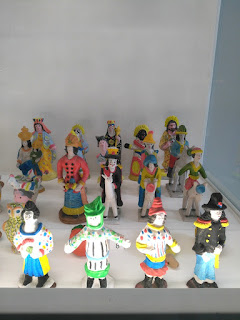dimanche 27 novembre 2016
Carpe diem (2)
Since Donald Trump was elected the 45th President of the United States, for some, it's the best of times; for others, the worst.
Commentators, specialists and ordinary people are asking, "What's next?"
Who knows? Only time will tell.
That's why I write today, as I wrote a month ago: carpe diem, seize the day!
And that's just what I'm doing, sitting on a marble bench, surrounded by marble columns in a park in the very city that gave "la dolce vita," the art of living easy, to the world.
For the past few days I've been in Rome, walking, observing, learning from the Romans, who seem more concerned with friends and family than work or the state of the world.
In restaurants, even late in the evening, families dine with small children. As the meal progresses from antipasto to primo and secondo courses, on to salad, cheese and dessert, children are passed from the laps of parents to grandparents, to aunts and uncles, cousins and friends, and each time they are cradled with love.
I also observe how parents often stroke their children's cheeks, a frequent tactile assurance of their affection and care.
Friends too show each other affection. Girlfriends wrap their arms around each other's shoulders. Boys are not afraid to touch, because touching is simply the Roman way of showing that you care.
Romans also have their own way of behaving in churches. In God's house they meet to rest, relax or chat, as if it were an extension of their home and living room.
Commerce too is more relaxed. I entered a supermarket to buy a snack of taralli, doughnut-like crackers brushed with olive oil, a bottle of water, and an apple. When I arrived at the checkout, the cashier, a simple employee, charged me for the water and the crackers, but gave me the apple as a "regalo," a gift.
In public transportation, young people jump up to offer their seats to gray-haired ladies (like me), and people make eye contact with strangers and sometimes even smile. This kind of behavior is unheard of in the Paris underground.
In Rome, people get sick and die. Some are rich and some are poor. Some sleep in the streets or in makeshift tent cities beneath umbrella pines. The city has its homeless and its refugees; it has danger and violence as well.
Yet Rome is different. This is a city that has been around for nearly 3,000 years: first Romulus and Remus, then the Etruscans, then the glory that was Rome.
Yesterday I visited the Ara Pacis, an altar built by the Emperor Augustus to glorify himself and the peace and prosperity of his reign. Facing it stood an obelisk whose shadow, once a year, fell on the very center of the altar. This happened on September 23rd, the first day of autumn, the day Augustus was born, proof the gods had destined him for glory.
At that time, the time of Chirst's birth, Rome was a city of one million inhabitants and the Empire extended from the Atlantic Ocean to the Red and Black Seas.
By the fifth century, after the barbarian invasions, the population had dropped to about 25,000, that of Pottsville in its heyday.
At the beginning of the 20th century, the once-great capital of an empire was a sleepy city of 500,000, surrounded by pine groves and swampy valleys infested with mosquitoes that spread "Roman fever," a particularly virulent form of malaria.
A few decades earlier, in 1871, the city had become the capital of a newly united Italy, created in 1861. In 1911, to celebrate the first 50 years of its existence, Rome organized an International Exposition of the Arts. Each region of united Italy had its pavilion, with local art and folk traditions on display.
Today those collections are housed in the Museo Nazionale delle arti e tradizioni popolari, the National Museum of Folk Art. I am sitting on its steps to write, in a part of the city far from the historic center and Rome's most famous monuments.
Known as EUR, this district of Rome was a project of Mussolini, who chose the most talented architects of his day to build a new city meant to become the setting for the 1942 World's Fair.
The fair never took place. World War II got in the way. Mussolini, the Duce, leader of Italy's National Fascist Party, never finished his grandiose project and died on April 28,1945, executed by a firing squad.
In Italy, leaders, governments, kingdoms and empires come and go. Carpe diem. The people, their art and traditions, remain, still as alive today as thousands of years ago.
Across from the museum of folk art, in another white-columned building, is the Museum of the Early Middle Ages. Its collections document Roman art and culture from the fall of the empire to the year 1000, a collection unique in Italy.
On a Saturday afternoon in late November, I am all alone in this museum, as I was in the museum of folk art.
When I leave, the cashier, the museum's guard, and an office employee are taking a coffee break. They invite me to join them. Carpe diem. I tasted the best coffee I've had in Rome.
Today the sun is shining. Yesterday the air was heavy with rain. A thunderstorm broke around midnight. The rest of the night was calm.
Before dawn, in the pine trees outside my window, a nightingale began to sing. I've rarely heard this mythic bird's song, but thanks to my English friend Libby, I know how to recognize its call. And with John Keats and the Romans I can say:
"The voice I hear this passing night was heard
In ancient days by emperor and clown."
Inscription à :
Articles (Atom)







